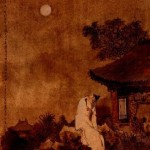Yu Fong-ying 余晃英 (WYK1961) recently started me to think about getting Chinese verse forms adapted for the English language as some worthy contribution to cross-cultural fertilization. Both the sonnet and the haiku have been successfully adapted into English from Italy and Japan, respectively. Maybe some Chinese verse forms too can be similarly adapted.
I picked Li Bai’s best known 4-line poem 夜思 as a first attempt at this adaptation. Over the Easter long weekend, with Fong-ying’s collaboration, we arrived at the version below to start the ball rolling for anyone who is interested in taking up this challenge. It does not have to be a translation. It can be a composition in the form of a 4-line pentasyllabic verse, 五绝 (wujue), preferrably in monosyllables and with the rhyme scheme of abcb, but any 4-line pentasyllabic verse will do. A 4-line septasyllabic verse, 七绝 (qijue), is fine too. Also see Fong-ying’s wujue English composition “This Place I Roam” below. –YK Chan (WYK1965)



夜思 李白 Nocturnal Thoughts Li Bai
(五绝) (Wujue : A four-line pentasyllabic verse) Tr. by YK Chan & FY Yu
床前明月光, Bed side, Bright Moon shines;
疑是地上霜. Ground frost comes so fine?
举头望明月, Up at Moon I look;
低头思故乡. Down, for home I pine.
Wujue: This Place I Roam 五绝: 此地堪浪游
By YU Fong-ying 余晃英作 陈耀国译
Red the maple leaves 枫叶红北国
White hilltops like dome 穹顶白岭头|
Homeland now it is 新乡兹落户
This new place I roam 此地堪浪游